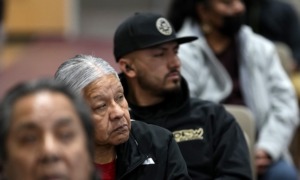On Jan. 20, I joined millions of Americans and millions more around the world to watch the inauguration of our 44th president. Bad knees kept me out of the crowd, but I dutifully taped the day for family and friends who went out to be counted. I beamed at the image of the soon-to-be president, head back, eyes closed, breathing in the wonderful music played by Yo-Yo Ma and Itzhak Perlman. I drank in the powerful words of the inaugural address, watching once, listening twice with eyes closed. I warmed to the close-ups of the people in the crowd – so much diversity, so much hope, so much respect for the moment and for each other.
The media coverage, however, left much to be desired. The multiple cutaways to crowds watching in Kenya and Selma chronicled African and African-American reactions to the power of the day, but did little to demonstrate the healing power of our new president’s election and message. Most of the people who were interviewed on the National Mall were African-American. No Latinos or Asians appeared on my screen to share their excitement. The crowd shots showed a diverse America coming together to celebrate the historic election of a person of color. But the close-ups and commentary focused on the importance of this day for African-Americans. The persistence of this media-massaged message left me wondering if those who voted for the man who asked us to come together as one felt somewhat betrayed.
Yes, we elected our first African-American president. The reality and the symbolism of this fact were not lost on me. My mother worked in restaurants in which she wasn’t allowed to eat. The older of my two sisters went to a segregated high school. The second integrated her high school, entering as a straight-A transfer student who found herself woefully behind her new white classmates, then graduating on the honor roll. I was a junior high school student in Washington when the riots began after Dr. Martin Luther King Jr. was shot and killed.
Maybe I’m not “black enough.” After all, I went to an elite college and married a white man. But as I watched history unfold and listened to the stories of those who braved the crowds to be a part of it, my pride reflected a more complex reality. Americans elected a 47-year-old man of humble background who exudes what we at the Forum for Youth Investment refer to as the 5Cs – competence, confidence, connections, character and caring – and who happens to be black. Some voted for him because of his blackness, some in spite of it, others because of his easy comfort with it.
All, however, stand to be hugely affected by his ability to bridge race, party and class lines. My 33-year-old daughter, inspired by the president, started a blog on being bi-racial. She lamented the extent to which this important part of his story was downplayed in the Inauguration Day coverage. I hope that young people across the country are inspired to read more, volunteer more, go to college, find their true loves, work hard, aim high, listen well, and give and expect respect.
Why does this matter?
Barack Obama inspired and mobilized young people in a way that no president, not even John F. Kennedy, has done before. His was, and is, a message of inclusion, optimism, vision, integrity and service. It was not just a message to African-American youth. The “we” in “Yes We Can” referred to all of us. President Obama shared the diverse pieces of his life and invited us to find ourselves among them. Identifying with him helped us identify with each other: White with black. Immigrant with native. Poor with affluent. Ivy League educated with street smart.
By being too strident in our declarations of this presidency as a long-awaited victory for Black America, those of us over 40 run the risk of turning a great victory that young people were instrumental in delivering into an overdue down payment on reparations. Black people were not owed a black president. We were owed the right to live in a country where a black man who proved himself to be more competent, confident, connected, caring and of character than his opponent could win the right to serve in our highest office. Having achieved this milestone, we need to share it, not hoard it.
Generating the impression that each group needs an equivalent victory in order to arrive pulls attention away from the fact that we have a true “5C” president. Let’s be sure that young people are taking home the right lesson. Once again, after a long hiatus, the country has shown that competence, confidence and character can trump concerns about ethnicity, race, family background, religion, geography and, yes, even age.
Karen Pittman is executive director of the Forum for Youth Investment. An expanded version of this column and links to related readings are available at http://www.forumforyouthinvestment.org.






























